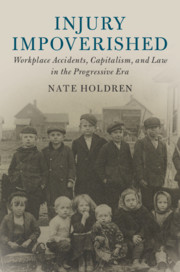Book contents
Conclusion
Resistance and Aftermath
Published online by Cambridge University Press: 06 April 2020
Summary
The Conclusion points out that injury rates remain disturbingly high in the present US and global economy, even if employment is somewhat safer than in the past. The Conclusion presents resistance to the negative sides of compensation laws that prior chapters focused on. Specifically, labor unions protested and sometimes struck over employment discrimination against disabled employees. Within that resistance, working-class people and their organizations articulated understandings of injury and of the employment relationship different from those held by employers and those present in the law. That resistance did not succeed, unfortunately. It matters for its own sake, and also matters interpretively to my argument, by underlining the losses and costs within compensation laws. The Conclusion uses the discussion of union resistance to help recapitulate the arguments of the book and to raise larger questions about law and capitalism. The Conclusion, like the Introduction and the Coda, also seeks to show how history writing can be a form of empirically grounded social criticism both enriched by and enriching of critical theory.
Keywords
- Type
- Chapter
- Information
- Injury ImpoverishedWorkplace Accidents, Capitalism, and Law in the Progressive Era, pp. 253 - 267Publisher: Cambridge University PressPrint publication year: 2020



